|
|
|
Sort Order |
|
|
|
Items / Page
|
|
|
|
|
|
|
| Srl | Item |
| 1 |
ID:
137551
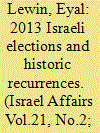

|
|
|
|
|
| Summary/Abstract |
The 2013 election campaign in Israel shows, at first glance, some unanticipated results and unexpected reactions of several political actors. Three events in particular can be noted: (1) the rise of a significant centrist middle-class party; (2) the association of the newly elected right-wing Prime Minister with his left-wing rivals; and (3) the revival of a national religious party after years of decline. A broad overview, however, reveals that from many perspectives numerous key elements of Israeli politics have remained broadly the same over the decades. Some unanticipated outcomes of the elections are to a substantial extent repetitions of past events, referred to in this paper as historic recurrences. In order to establish this claim about historic recurrence, each event is compared to past events with which several striking similarities are found. In order to explain the phenomenon of historic recurrence in Israeli politics, two sets of concepts are applied: the sociological terminology regarding reference group and collective identity, and rational choice theories about voter behaviour and the preferences of political actors.
|
|
|
|
|
|
|
|
|
|
|
|
|
|
|
|
| 2 |
ID:
137550
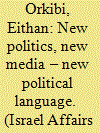

|
|
|
|
|
| Summary/Abstract |
Political campaigns running during the Israeli general elections of 2013 saw a rapidly growing use of new media. According to reports, most of the electronic campaign activity focused on candidates' or their respective party's Facebook page. This article explores the rhetorical dimensions of electronic campaigns and particularly focuses on the formation of the public image of three candidate, all of whom were identified with the promise of a ‘new politics’: Yair Lapid, head of the newly formed ‘middle class party’ Yesh Atid; Shelly Yachimovich, head of the Israeli Labour Party; and Naftali Bennett, newly elected head of the religious Zionist party, Habayit Hayehudi. The rhetorical analysis uncovers three discursive strategies used by all three candidates: informality, meta-textuality and narrativity. These discursive strategies transform the campaign microblogs into personal ‘campaign diaries’ used by the candidates to account for ‘behind the scenes’ anecdotes, impressions and insights. The analysis shows that candidates used personal Facebook microblogs to strengthen their image as authentic and complex characters, rather than mediated personas engineered by campaign managers. This article argues that such political images were strategically designed in order to support the campaigns' promise to break from the ‘old politics’ and warrant the candidates' commitment to the ‘new politics’.
|
|
|
|
|
|
|
|
|
|
|
|
|
|
|
|
| 3 |
ID:
137545
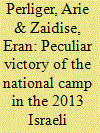

|
|
|
|
|
| Summary/Abstract |
This article argues that attempts to characterize the outcome of the elections to the 19th Knesset as a defeat of the Israeli right are misleading. By using a three-dimensional analysis of the ideological makeup of the Knesset, based on the ideological manifestos of the parties, the socio-demographic profiles of Knesset members and analyses of election results utilizing electoral data and socio-demographic data obtained from Israel's Central Bureau of Statistics (CBS), the article claims that the 19th Knesset is no less right-leaning than its predecessor. Hence, contrary to some commentators in both the media and academia, the 2013 elections represent a true landmark for the settlers. For the first time since the movement appeared in the 1970s, it managed to obtain a solid base in the Knesset.
|
|
|
|
|
|
|
|
|
|
|
|
|
|
|
|
| 4 |
ID:
137548
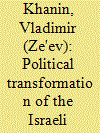

|
|
|
|
|
| Summary/Abstract |
The Great Aliya from the USSR and the post-Soviet states began a quarter of a century ago, bringing to Israel about 1.1 million Russian-speaking Jews and their family members. This population corresponds to approximately 19 Knesset seats, and is thus a crucial factor in Israeli electoral politics. From the late 1990s this community was almost equally divided in its sympathy between nationwide mainstream parties and Russian sectarian immigrant parties. However, if previously there were either purely sectarian or nationwide parties, in the past decade the majority of Russian Israelis prefer new types of political representation: either a ‘Russian party with an Israeli accent’ (mainly Israel Beiteinu) or an all-Israeli party with some Russian accent (i.e. Likud). Nevertheless, despite the similarities in the ideological orientations and socioeconomic views, the Russian-speaking supporters of both political parties represent two distinct political cultures among the Israeli community of former Soviet Union olim and their children. This may explain why the joint list of Likud–Israel Beiteinu during the 2013 Knesset elections experienced substantial losses of each party's traditional ‘Russian’ (as well as general) voters, many of whom opted this time for parties of the ‘contentious middle class’ – the right-wing Habayit Hayehudi and ‘centrist’ Yesh Atid. This article argues that in the coming years, the Russian community's politics in Israel will continue to search for an optimal model of combination of a party's ethnic base with a mainstream platform, and which constitute an exemplary model and inspiration of political participation for other ethnic or cultural identity oriented groups, such as English-, French- and Amharic-speaking immigrants, and for the ‘new haredim’.
|
|
|
|
|
|
|
|
|
|
|
|
|
|
|
|
| 5 |
ID:
137544
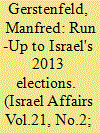

|
|
|
|
|
| Summary/Abstract |
On 15 October 2012, the 18th Knesset – which had been elected in February 2009 – voted unanimously to dissolve. The date for the elections for the 19th Knesset was then set for 22 January 2013. This article follows the events leading to the election day. It shows that there were four distinct phases during that period. It describes the internal organization and primary elections in Israel's major parties, Likud and Avoda; the debate about the formation of political alliances which led to the joint list of Likud–Israel Beiteinu; the stabilization of the political blocs; and the emergence of new political forces (such as Yesh Atid). The article also discusses the impact of major events, such as the military operation Pillar of Defence, on the elections and the electoral campaign. The article discusses the parties’ campaigns and the proliferation of opinion polls. It also shows that much of the campaigning of the parties was directed against other parties of the same bloc, be it the centre-right or the centre-left.
|
|
|
|
|
|
|
|
|
|
|
|
|
|
|
|
| 6 |
ID:
137546
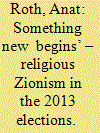

|
|
|
|
|
| Summary/Abstract |
Habayit Hayehudi party was one of the most noteworthy phenomena of the general elections held in Israel in 2013. In the 2009 elections the party's main predecessor only won three seats, and polls conducted in the first half of 2012 cast doubt upon its chances of passing the minimum threshold. Defying these predictions, Habayit Hayehudi won 12 seats to become the fourth largest Knesset party. This article's primary claim is that the party's success derived from its leaders' ability to cater to the aspirations and needs ensuing from the traumatic 2005 Gaza disengagement and to replace the feelings of distress and disorientation with a positive momentum.
|
|
|
|
|
|
|
|
|
|
|
|
|
|
|
|
| 7 |
ID:
137549
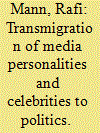

|
|
|
|
|
| Summary/Abstract |
The electoral success of Yair Lapid's Yesh Atid party in the 2013 Knesset elections is discussed in this article as a test case of a worldwide phenomenon of celebrities, among them media personalities, who enter the political field. Bourdieu's interpretive research framework regarding symbolic and social capitals, as well as media capital, is used here to analyse Lapid's versatile career and celebrity status as the background to his performance during the campaign and his ability to win 19 seats in the Knesset. The article also places Lapid's case in the context of political and social developments in Israel in the last decades.
|
|
|
|
|
|
|
|
|
|
|
|
|
|
|
|
| 8 |
ID:
137547
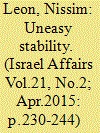

|
|
|
|
|
| Summary/Abstract |
This article examines the emergency election campaign launched by the Haredi parties in anticipation of the 2013 general elections in Israel, in order to attract the votes of those generally perceived as their automatic supporters – the Haredim. The 2013 campaign was a struggle for the ‘converted’ – the Haredi vote – amongst UTJ and Shas supporters alike. The battle was fought openly and assertively. The intensive efforts ultimately achieved what may be described as an uneasy electoral stability. The reasons for this situation, and how the Haredi parties addressed it, is the subject of this article.
|
|
|
|
|
|
|
|
|
|
|
|
|
|
|
|
|
|
|
|
|